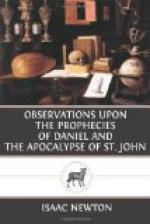After these things [12] Charles gave the City and Duchy of Rome to the Pope, subordinately to himself as Emperor of the Romans; spent the winter in ordering the affairs of Rome, and those of the Apostolic see, and of all Italy, both civil and ecclesiastical, and in making new laws for them; and returned the next summer into France: leaving the city under its Senate, and both under the Pope and himself. But hearing that his new laws were not observed by the judges in dictating the law, nor by the people in hearing it; and that the great men took servants from free men, and from the Churches and Monasteries, to labour in their vineyards, fields, pastures and houses, and continued to exact cattle and wine of them, and to oppress those that served the Churches: he wrote to his son Pipin to remedy these abuses, to take care of the Church, and see his laws executed.
Now the Senate and people and principality of Rome I take to be the third King the little horn overcame, and even the chief of the three. For this people elected the Pope and the Emperor; and now, by electing the Emperor and making him Consul, was acknowledged to retain the authority of the old Roman Senate and people. This city was the Metropolis of the old Roman Empire, represented in Daniel by the fourth Beast; and by subduing the Senate and people and Duchy, it became the Metropolis of the little horn of that Beast, and completed Peter’s Patrimony, which was the kingdom of that horn. Besides, this victory was attended with greater consequences than those over the other two Kings. For it set up the Western Empire, which continues to this day. It set up the Pope above the judicature of the Roman Senate, and above that of a Council of Italian and French Bishops, and even above all human judicature; and gave him the supremacy over the Western Churches and their Councils in a high degree. It gave him a look more stout than his fellows; so that when this new religion began to be established in the minds of men, he grappled not only with Kings, but even with the Western Emperor himself. It is observable also, that




